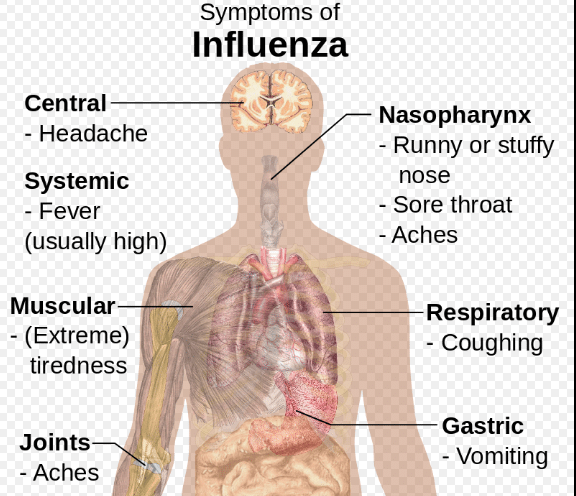Seasonal Influenza: Current Updates and Health Tips
Influenza is characterized by fever (temperature of 100°F [37.8°C] or greater) with cough and/or sore throat.
Influenza viruses spread from human to human via aerosols created by coughs or sneezes of infected individuals .The incubation period of influenza ranges from 18-72 hours. Viral shedding occurs at the onset of symptoms or just before the onset of illness (0-24 h). Shedding continues for 5-10 days. Young children may shed virus longer, placing others at risk for contracting infection with the virus. Shedding may persist for weeks to months in highly immunocompromised persons.
The presentation of influenza virus infection varies; however, it usually includes many of the symptoms shown here. Patients with influenza who have preexisting immunity or who have received vaccine may have milder symptoms. Abrupt onset of illness is common. Fever may vary widely among patients, with some having low fevers (in the 100°F range) and others developing fevers as high as 104°F (40°C). Sore throat can be severe and may last 3-5 days. In children diarrhea may be a feature.
Findings of standard laboratory studies, such as a complete blood cell count and electrolyte levels, are nonspecific but helpful in the workup of influenza. Leukopenia and relative lymphopenia are typical findings in influenza. Thrombocytopenia may be present.
Most frequently, hospitalization is necessary when influenza exacerbates underlying chronic diseases. Some patients, especially elderly individuals, may be too weak to care for themselves alone at home. On occasion, the direct pathologic effects of influenza may require hospitalization; most commonly, this is influenza pneumonia.
Patients with influenza generally benefit from bed rest, and most patients recover in 3 days; however, malaise may persist for weeks.[1] After the development of influenza, antiviral agents can reduce the duration and severity of illness. To be effective, the medications must be administered within 40 hours of symptom onset. Oseltamivir is taken orally (75 mg bid for 5 d).
The influenza vaccine is recommended by the World Health Organization and United States Centers for Disease Control and Prevention for high-risk groups, such as children, the elderly, health care workers, and people who have chronic illnesses such as asthma, diabetes, heart disease, or are immuno-compromised among others.


+1.svg)
